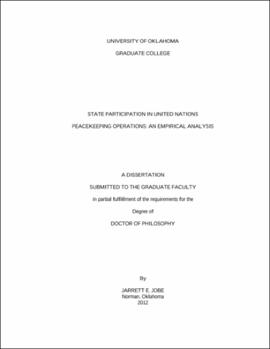State Participation in United Nations Peackeeping Operations: An Empirical Analysis
| dc.contributor.advisor | Grillot, Suzette | |
| dc.creator | Jobe, Jarrett | |
| dc.date.accessioned | 2019-04-27T21:26:37Z | |
| dc.date.available | 2019-04-27T21:26:37Z | |
| dc.date.issued | 2012 | |
| dc.identifier | 99195920902042 | |
| dc.identifier.uri | https://hdl.handle.net/11244/318702 | |
| dc.description.abstract | This dissertation examines states and their motivations in contributing troops to UN peacekeeping operations through the three primary International Relations approaches of realism, liberalism and constructivism. Current literature and research provide minimal application of IR approaches and their explanations of peacekeeping. Examining peacekeeping operations from 1991-2007, state contributions are measured for the overall time period and for each individual peacekeeping operation through a number of independent variables that represent each approach. Regression analysis combined with table and graphical analyses provide results that develop a deeper understanding of peacekeeping and IR approaches. The geographic relationship a state maintains from the host peacekeeping state is suggested to have the most significant relationship with troop contributions in this analysis. For the permanent five members of the UN Security Council there have been significant changes in their pattern of troop contributions to UN peacekeeping operations over time compared to overall contribution patterns. These discoveries provide a deeper understanding of peacekeeping as a tool for mitigating conflict in the international system through international relations approaches. | |
| dc.format.extent | 239 pages | |
| dc.format.medium | application.pdf | |
| dc.language | en_US | |
| dc.relation.requires | Adobe Acrobat Reader | |
| dc.subject | Peacekeeping forces | |
| dc.title | State Participation in United Nations Peackeeping Operations: An Empirical Analysis | |
| dc.type | text | |
| dc.type | document | |
| dc.thesis.degree | Ph.D. | |
| ou.group | College of Arts and Sciences::Department of Political Science |
Files in this item
This item appears in the following Collection(s)
-
OU - Dissertations [9426]
